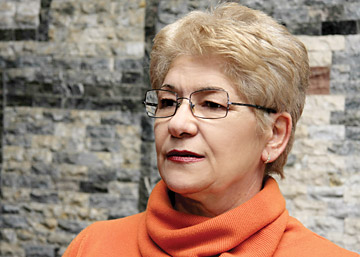Marking May as the “Short Story Month,” Words Without Borders highlights some of its stellar past publications, the Dagestani-Russian novelist Alisa Ganieva’s bitterly comic “A Village Feast” among them.

Edi Shukriu (IWP 2005; poet, playwright, professor, politician; b.1950, r. Kosova), one of the first Kosovar women to publish poetry in the Albanian language, teaches archeology and ancient history at the University of Pristina. Her literary work includes seven books of poetry, among them Eternity and Night’s Eye, and the plays "The Return of Eurydice" and "Little Red Riding Hood from the 'Hood ." She has served in the Kosovar Parliament, as a diplomat in the Foreign Ministry, and as a member of the presidency of the Democratic League of Kosova (LDK); she established the region’s first women’s democratic organization, the Women's Forum, and co-founded the Democratic Alternative of Kosova.
Literary/ personal
IWP: What books and journals are on your night stand right now?
ES: La bouboulina by Michel de Grèce – I was glad when it came two days ago. Also the books and journals from a recent international scientific-literary symposium Forum Tomizza, held earlier this year in Croatia, Slovenia and Italy.&
IWP: And what writing projects do you have open on your desktop? Which one are you most eager to finish?
ES: As usual, several: some new poems, a new play “The Persian Cat and Lady”,a review of the book Distinguished Albanian Women in English and Montenegrin… I am eager to accomplish my novel Broken Mirror (in Albanian) and publish it in translation….. I find it important for a better understanding of the NATO intervention in Kosova in 1999 and, also for the inter-ethnic understanding in our days, as it deals with Kosova’s everyday life in the condition of the undeclared war during the Serbian occupation (1989-1999).
IWP: What routines or rituals does it take for you to get your writing to flow?
ES: Coffee and the computer help to wake me up, and I continue writing for hours if I do not have daily obligation. For sure, writing has been my life ever since my ‘prehistoric’ days - literature, science… Writing gives me the energy to pass through the labyrinth of life, to escape from the daily routine.
IWP: Has your time in Iowa City left any long-term impressions?
ES: IWP and Iowa City became part of my life: there, for three months, I found hospitality, spiritual calm and an opportunity for creative writing. IWP also gave me a chance to see in place the magic triangle living still in me: writers from different countries with diverse experiences, the University of Iowa, and the citizens of Iowa City. IWP gave me the great opportunity to, for the first time in my life, do nothing but write; it helped me also to feel more deeply that this world and its literature is our common human heritage provided we use it for positive changes. Thanks to IWP I am also in close contact with the splendid archaeologists and anthropologists of the University of Iowa and Office of the State Archaeologist. In other words, the IWP changed my life--mdash; for good.
Literary/generic
IWP: What writers and work out there are in need of more translation and attention? What literary neighborhoods excite you most right now?
ES: I think Albanian literature need more translation since it is not known to the world. It is needed because, having good writers, it brings different perspectives and experiences, which can reach not only last decades experience but also those of millenniums from now.
IWP: From your vantage point, is a Ministry of Culture/Education a useful institution? That is, do you think the state should be involved in artistic production? How?
ES: Relevant ministries of Republic of Kosova could be useful institution, if the right persons are in the right place. I think that in the case of Kosova, the state should be involved in artistic production, having in mind that private production has not yet reached the scale we might wish for, and that artists had no support during the years of occupation by Serbia and after the war. For now Ministries should be supporting high level artistic works/publications, while respecting all necessary criteria. They should support translations, tooso as to promote culture as a part of world cultural diversity.
General/politics
IWP: It seems as if, much more than a few decades ago, religion has come to play a visible role in public affairs. Is this the case in your part of the world, and if so, what are the effects of this turn?
ES: YReligion in Kosova has always been a private issue, especially because of the existence of three main religious systems. It was the ground for mutual respect and tolerance, which characterize the Albanian nation.
IWP: What—if anything--mdash; has given you a cause for political optimism in the last decade?
ES: I see it in the results of the superhuman efforts of the Kosova people to achieve independence and democracy, especially during the years 1989-1999, in which I too took an active part. The support of international community, led by the US, is the other reason for my political optimism. And, finally, the recognition of the Republic of Kosova in 2008. Globalization, respect for identities and cultural diversity, and the new democracies feed my optimism as well. If the rule of law will take hold everywhere, the world could be better, and we might travel without the need for the awful procedures of getting a visa. God didn’t make borders; humans should destroy the borders they put in place.
Find Us Online